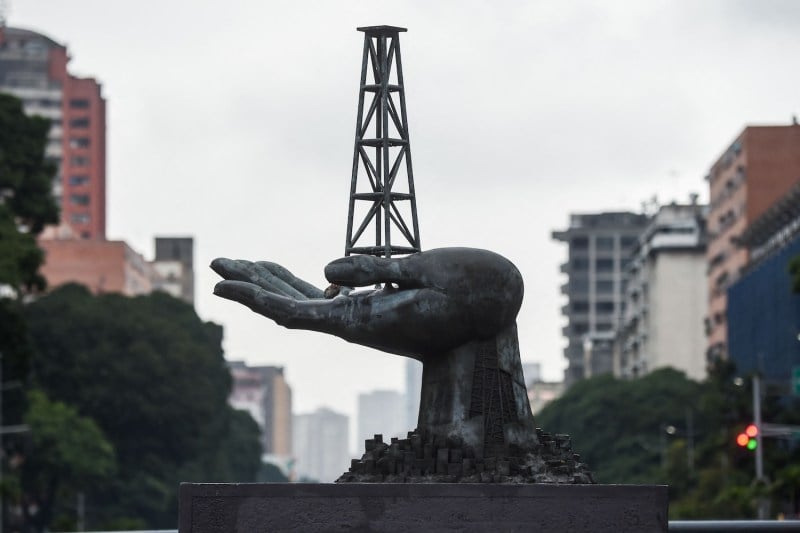Trump Risks Playing the Patsy

A Ukrainian reconnaissance drone team from the 110th Brigade continues its operations near the frontline in the direction of Velyka Novosilka, Donetsk Oblast, Ukraine, on Feb. 19. Wolfgang Schwan/Anadolu/Getty Images
The Trump administration has launched a fast-track effort to end the Russia-Ukraine war, but it is in danger of undermining its own approach. Key elements of the plan have been clear for months: a cease-fire roughly along the current front line, with the Ukrainian-held portion of Russia’s Kursk region an unresolved bargaining chip in Kyiv’s hand, and security arrangements for Ukraine, principally involving European troops but backed by U.S. air power and other support.
This could work. A sovereign and secure Ukraine would be a big win for Europe and the United States, even if the Ukrainian government controls only part of its country for the time being, like the West German government during the Cold War.
The Trump administration has launched a fast-track effort to end the Russia-Ukraine war, but it is in danger of undermining its own approach. Key elements of the plan have been clear for months: a cease-fire roughly along the current front line, with the Ukrainian-held portion of Russia’s Kursk region an unresolved bargaining chip in Kyiv’s hand, and security arrangements for Ukraine, principally involving European troops but backed by U.S. air power and other support.
This could work. A sovereign and secure Ukraine would be a big win for Europe and the United States, even if the Ukrainian government controls only part of its country for the time being, like the West German government during the Cold War.
Security for Ukraine is critical. Insisting that Europeans put up the troops to deter renewed Russian attacks after a cease-fire is a bold move, and it is gaining traction. The United States has asked its European allies to specify what they are willing to provide to support Ukraine. This blunt approach may be intended to push the Europeans to put up or shut up. Some of them even seem to be getting closer to putting up: British Prime Minister Keir Starmer has essentially accepted the challenge and will be visiting Washington next week to flesh it out. That’s not a deal, but it’s a promising start.
Now, however, U.S. President Donald Trump seems to be getting in the way of his own plan. The recent U.S.-Russia talks in Saudi Arabia seemed fine. There was no breakthrough, only the beginning of a process. But Trump’s subsequent attacks on Zelensky and apparent demands that Ukraine hold elections as a precondition for talks may break the momentum that Trump’s initial push had generated. The fight with Zelensky may be intended to soften the Ukrainians, but it has the effect of strengthening Russia’s hand, which is hardly the best negotiating tactic.
There will be more tests to come. Will Washington push Moscow to end the war, or will the Trump administration give in to the Kremlin’s demand that Ukraine hold elections first? Will the United States have its European allies’ backs if they agree to send forces to Ukraine? Will the Trump administration fritter away its leverage by agreeing to sanctions relief before Russia has earned it by fulfilling all the terms of a cease-fire? Reports that the United States was seeking to soften G-7 language that called out Russian aggression are dismal; they recall previous and foolish U.S. attempts to buy Russian goodwill through preemptive concessions that the Kremlin regards as weakness.
The Trump administration risks playing the patsy. If it sticks to its own best positions on Ukraine—and to peace through strength—it could succeed. Or it could stoop to a dirty deal with a dictator. It’s game time, and the Trump team needs to level up.
This story is part of a collection on what’s next for Ukraine and Europe. Read the full package here.
Daniel Fried is a distinguished fellow at the Atlantic Council, a former U.S. coordinator for sanctions policy during the Obama and first Trump administrations, a former assistant secretary of state for European and Eurasian affairs during the Obama and George W. Bush administrations, and a former U.S. ambassador to Poland.
More from Foreign Policy
-

A security guard stands at the entrance to the U.S. Agency for International Development (USAID) headquarters on Feb. 3. DOGE Is Hacking America
The U.S. government has experienced what may be the most consequential security breach in its history.
-

A man with a beard in a suit and tie speaks behind a teleprompter. The logo for MSC is behind him. Vance Leaves Europe Gobsmacked
U.S. Vice President J.D. Vance delivered a rebuke on immigration and alleged censorship to a shocked Munich Security Conference.
-

A Palestinian girl carries a child through the rubble of houses destroyed by Israeli bombardment in Gaza City on March 3, 2024. Why Is the World So Polarized on Gaza?
The answer might be linked to race and colonization, explains author Pankaj Mishra, speaking on FP Live.
-

An attendee dressed like Uncle Sam waits for Donald Trump to arrive for a campaign rally at the Mosack Group warehouse on September 25, 2024 in Mint Hill, North Carolina. America Is Its Own Worst Enemy
It’s not unprecedented for a powerful country to simply shoot itself in the foot.







Join the Conversation
Commenting on this and other recent articles is just one benefit of a Foreign Policy subscription.
Already a subscriber?
.
Subscribe
Subscribe
View Comments
Join the Conversation
Join the conversation on this and other recent Foreign Policy articles when you subscribe now.
Subscribe
Subscribe
Not your account?
View Comments
Join the Conversation
Please follow our comment guidelines, stay on topic, and be civil, courteous, and respectful of others’ beliefs.
Change your username |
Log out
Change your username:
CANCEL
Confirm your username to get started.
The default username below has been generated using the first name and last initial on your FP subscriber account. Usernames may be updated at any time and must not contain inappropriate or offensive language.